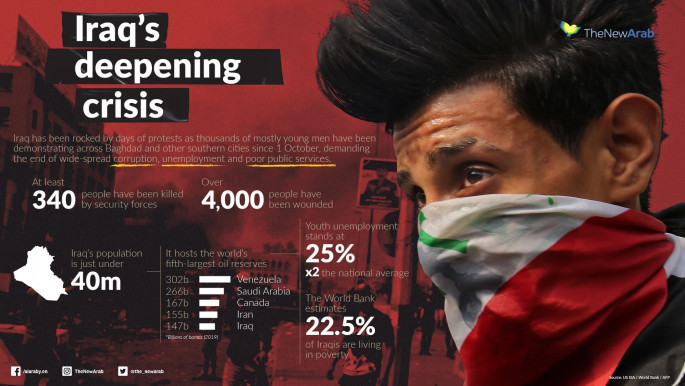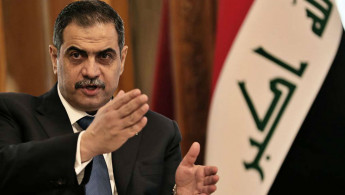Sweden probes Iraq's defence minister for 'crimes against humanity' after being linked to benefit fraud
Media reports suggest that the recent case is related to the shooting dead of hundreds of protesters.
Iraq's Defence Minister Najah al-Shammari is thought to be the subject of inquiry, according to Swedish media, though the Swedish Prosecution Authority did not identify the minister.
The prosecutors' body said in a statement that it had received complaints about "an Iraqi minister suspected of crimes against humanity". The investigation was "in a very early stage", it added.
Several Swedish media outlets, including the country's main dailies, identified him as al-Shammari, reporting that he was also a Swedish citizen, though he goes by a different name in Sweden.
An unnamed Swedish-Iraqi lawyer told Svenska Dagbladet newspaper that he had reported al-Shammari to police in October for his role in the shooting of hundreds of protesters during weeks of unrest.
The defence minister is also under investigation for benefits fraud for claiming housing and child benefits from Sweden despite living in Iraq, according to online news site Nyheter Idag and Swedish newspaper Expressen.
Swedish social insurance agency Forsakringskassan told AFP that they were unable to confirm whether they were investigating al-Shammari as all their cases are classified.
Al-Shammari arrived in Sweden in 2009 and was granted a permanent residency in 2011 before getting his citizenship in 2015, according to Expressen.
Meanwhile, Iraq's capital and majority-Shia south have been swept by mass rallies protesting corruption, a lack of jobs and poor services since 1 October.
Those demonstrations have escalated into calls for a complete overhaul of the ruling elite.
An estimated 350 protesters have been killed and thousands wounded in clashes with the security forces, according to a tally compiled by AFP. The authorities in Iraq no longer update their figures.
 |
On Sunday, Iraq's defence ministry claimed it did not imported lethal tear gas grenades behind the gruesome deaths of protesters.
Al-Shammari did not sign an agreement to import the military-grade grenades, which weigh up to ten times the weight of regular tear gas canisters, it said, according to German news agency dpa.
Amnesty International condemned Iraqi security forces for their alleged use of the lethal tear gas grenades last month.
While regular tear cas canisters can prove deadly, especially if directed at someone's head, the military-grade grenades have been responsible for horrific injuries.
Videos and photos shared on social media since the crackdown on dissent intensified in late October show the smoking grenades lodged in the skulls of demonstrators.
Activists and rights organisations have accused Iraqi security forces of deliberately targeting protesters' heads.
"All the evidence points to Iraqi security forces deploying these military-grade grenades against protesters in Baghdad, apparently aiming for their heads or bodies at point-blank range," Lynn Maalouf, Amnesty's Middle East Research Director, said in a statement last month.
Iraq's defence ministry on Sunday denied buying the grenades, which Amnesty researchers identified as being manufactured in Serbia and Iran.
The ministry also denied official security had used the grenades, blaming the deadly force on an unidentified "third party".
This "third party" was responsible for using the lethal grenades in order to create "chaos", it said, adding that the ministry and government supported the rights of civilians to protest.
Although protesters have blamed some of the deadly violence on Iraq's official security forces, the Iran-linked Hashd al-Shaabi, or Popular Mobilisation Forces militias, have also been identified by activists as attacking demonstrators.
Follow us on Twitter and Instagram to stay connected





 Follow the Middle East's top stories in English at The New Arab on Google News
Follow the Middle East's top stories in English at The New Arab on Google News
![The UAE is widely suspected of arming the RSF militia [Getty]](/sites/default/files/styles/image_330x185/public/2024-11/GettyImages-472529908.jpg?h=69f2b9d0&itok=Yauw3YTG)
![Netanyahu furiously denounced the ICC [Getty]](/sites/default/files/styles/image_330x185/public/2024-11/GettyImages-2169352575.jpg?h=199d8c1f&itok=-vRiruf5)
![Both Hamas and the Palestinian Authority welcomed the ICC arrest warrants [Getty]](/sites/default/files/styles/image_330x185/public/2024-11/GettyImages-2178351173.jpg?h=199d8c1f&itok=TV858iVg)